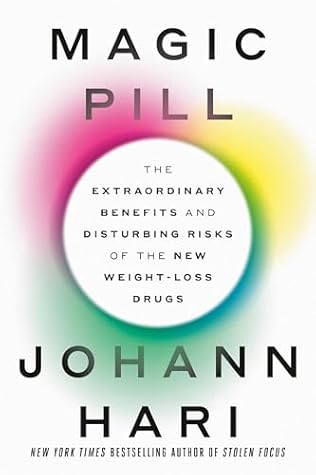More on this book
Community
Kindle Notes & Highlights
by
Johann Hari
It turns out that after they quit, most people regain two-thirds of the weight they have lost within a year.
This means that for the medication to work, you have to take it forever.
Ozempic, for diabetics, and Wegovy, for obese people. They are the same drug, sold for different purposes, and Wegovy can be prescribed at higher doses.
You become constipated because the surge of GLP-1 slows down your gut and its emptying. The food and waste sit inside you longer and find it harder to get out. Similarly, you burp because “the valve that sits at the bottom of the stomach doesn’t open as quickly. The air must go somewhere, so instead of it going down into the small intestine, people start burping.” You become nauseous because the drug creates a sensation of extreme satiety—that you are full and can’t eat any more. The human brain struggles to distinguish between extreme satiety and sickness: the two signals get easily mixed up,
...more
you are exposed to this food for a while, Paul concluded, the desire for it is so great that you will ignore all sorts of negative consequences.
The first way that ultra-processed food undermines our satiety is strangely simple. You chew it less. It is, Tim explained, “generally very soft…It is adult baby food.”
The second way our satiety is being undermined is that these manufactured foods often contain that uniquely powerful combination of sugar, fat, and carbs—and this seems to activate something primal in us.
The third way is that processed food seems to affect your energy levels differently. When you consume food, your body breaks it down into blood sugar—your body’s main source of energy—and sends it all over your body to power you through the day. When your blood sugar levels dip, you run out of energy and get the signal that you want to eat again.
The kind of food my dad grew up eating releases energy slowly and steadily into your body, and if you eat it, your blood sugar will dip two or three times a day, around mealtimes, and you’ll be hungry only then.
The fourth way is that processed food lacks two things we really need—protein and fiber.
The fifth way is that a lot of the drinks we now consume contain chemicals that may be actively triggering us to be more hungry.
You drink something sweet, and it expects a surge of energy from sugar. Everything in our evolution primes you for it. When it doesn’t come—when your brain realizes it’s been tricked—it responds by making you more hungry, to give it that fresh surge of energy it was expecting, and
so “you suddenly want cake.”
This new kind of food has done something unprecedented: it has separated flavor from the underlying quality of our food.
The seventh factor is that these foods seem to cause your gut to malfunction, in ways that undermine satiety.
As a culture, I’m afraid we have given up on the whole idea of prevention.” Instead, we choose risky quick fixes.
“We don’t know the long-term side effects” of these new weight-loss drugs, “but we do know the long-term side effects of living with obesity.” You have to choose your risk.
diets fail most of the time because we are sabotaged by our biology and our environment.
2 percent of people who lost 31 pounds or more, and kept it off for twelve months, achieved it solely by exercising.
If you exercise for 270 hours a year, you’ll add, on average, three years to your life. Exercise works unbelievably well at preventing all sorts of problems, from heart attacks and strokes to an early death. What it doesn’t work well at is—alas—producing weight loss.
So I asked myself: While that window is open, are you going to use this opportunity to change your habits, gain some self-understanding, and learn some skills to live more healthily? Or are you going to squander this opportunity by eating half a cheeseburger instead of a whole cheeseburger—and in a few years possibly end up right back where you were at the start?
What can your body do that you appreciate and value?
Realizing and reflecting on this prompts you to “shift your focus away from what your body looks like, to what your body’s able to do.” That is a profoundly healing change.


